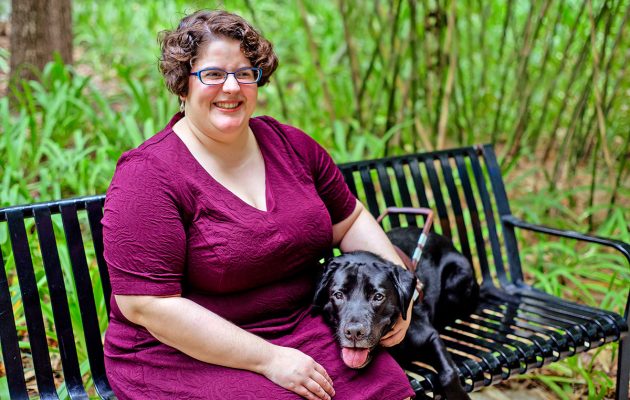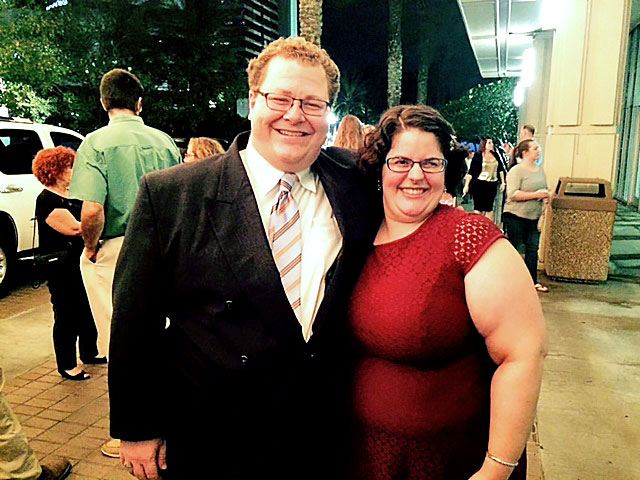St. Nicholas resident views life from different perspective

Because she can’t see, Emily Michael has a different view of life growing up in St. Nicholas, where she lives and went to high school. She views the world from the perspective of someone who is considered “different,” a label that she said doesn’t define her, but instead, allows her to embrace opportunities as a way to broaden others’ perspectives.
Born legally blind as the result of leber congenital amaurosis, a condition similar to RP. She currently lives with her parents in their “starter home,” which is how her mother describes the 1940s house in St. Nicholas she and her husband bought with the help of their parents when they married.
Michael has good memories about growing up in St. Nicholas with her three siblings, Marie, the oldest, a pharmacist at Wolfson Children’s Hospital, Angela a nurse, also at Wolfson, and Simon a teacher.
Although six years separate Michael from her sister, Marie, Michael said she has the most in common with her. “We both love learning and reading,” she said, adding that she can read large print or braille and often listens to audio versions of books. While her other siblings were busy playing, Emily and Marie often had to be ordered to stop studying by their mother.
Being blind didn’t grant Michael any special privileges with her siblings, or her mother for that matter, Emily recalled. “When we were little, my brother and sisters told me that Emily was spelled P-E-S-T,” she laughed.
“Often people with normal vision can’t imagine a world where a blind person isn’t constantly obsessed with her own blindness. We live in a world where ‘sighted’ is the standard, the norm, and it’s implied that blind people have a lot of compensating to do so that we can get as close to that norm as possible. But you can’t overcome blindness. It’s part of who you are, just like being a woman. I had to learn to manage within a primarily visual system but living with a disability is not extraordinary or exceptional. It doesn’t make me an inspiration or a superhero. My family and friends were even less obsessed with my blindness than I was,” she explained.
“Life was simple then. We had lots of good times playing in our postage stamp-sized backyard on the swings, in the kiddie pool and in the playhouse with 3-D flowers that my dad built, while my mom hung clothes on the line. We had picnics in the yard, and we always had friends over to play with us,” Michael said.
“My mom liked to have us in the kitchen. You could graduate from grating cheese to peeling carrots,” she said. “My dad liked to cook, too, and would ask me to help him season things. ‘What does it need?’ he’d ask me. Everyone assumed I had a heightened sense of smell because I couldn’t see, not necessarily a good thing when they wanted me to tell them if food had spoiled.”
Michael’s mom encouraged her to figure things out for herself and not allow her blindness to be a handicap. “I remember her teaching me how to vacuum and scrub the toilet. I told her that I hated vacuuming because I couldn’t see the floor. She said she’d put baby powder all over the floor, and then I could see it. My sarcastic reply was, ‘Thanks, Mom!” she laughed.
Elementary school presented few problems for Michael. She attended San Jose Catholic School through middle school, where her siblings and neighborhood friends also went. “I grew up with those kids,” she said. “They were used to me, plus, I didn’t use a cane then. I was a little nerd who loved reading,” she said.
Michael sang in the chorus, was in the school plays and took music lessons starting at 3 years old. By fourth grade she knew she wanted to be a writer. “I was always writing stories, even when I was supposed to be listening to my teacher in class.”
In middle school, she watched her teachers teach and critiqued them. “The teacher in me was brewing even then,” she said.
When she moved on to Bishop Kenny High School, she was the only kid with a white cane. “Kids would say that I didn’t look blind and didn’t really need the cane, so I must have it so that I could trip people,” she said.
Her therapist had recommended that Emily use a cane to help her safely navigate a bigger, unfamiliar environment. “My mom told me later that it was hard for her to see me having to use a cane because suddenly it made me more public as a blind person,” she said. “She had her cry in private because she realized that was her problem, not my problem.”
Michael remembered hearing a lot of whispering and giggling when she went by students. “But I had a tight group of friends, all of us nerds and ‘misfits,’ who stuck by me. My chorus teacher was tiny and could be tough, but one day when I came to chorus upset because of what some student had said to me, she told me that people like that don’t define who I am; I define who I am. That made a big impression on me.”
Following in her siblings’ footsteps, Emily attended the University of North Florida. She earned an English degree and was so happy with the experience, especially the English Department faculty, that she stayed to get her master’s in English.
College was not without its challenges, however. “Accommodations at UNF were some-times difficult,” she said. “I would often show up to take an exam and find that the professor didn’t have an enlarged version of the text that I had requested ahead of time.”
As she became more comfortable advocating for herself, things improved. In graduate school, many of the professors had taught her in undergraduate classes and knew what accommo-dations she needed.
“I understand that for most people a disability is not the norm and that it will take them awhile to adjust,” Michael said.
Michael has been teaching since the fall of 2012. She has talked with students and other professors about how to teach students who do not naturally excel in writing and reading classes. “When I first started teaching, I couldn’t imagine why every student didn’t just love being in class, because I always did. One of my students told me that when you’re a C student you’re nervous to come to class because you are anxious that you’re not good enough or that you might fail,” she said. “I learned it is my job to make everyone feel confident, to help them feel it is not scary to approach subjects they don’t feel competent about handling.”
Michael has developed a good system in terms of reading. “I listen to an audio version and annotate on paper at the same time.” Her students print their work in 18-point type. Bright light is a problem for her, so she needs classrooms with variable lighting and wears dark glasses when she is outside.
UNF’s THRIVE staff often place students in her class because they know she is comfortable working with them. THRIVE provides supplemental resources for degree-seeking students with autism spectrum disorders. She has also had a couple of blind students, too. “That was cool because they had never seen a blind professor, and I hadn’t either,” she said.
“I want to publish a full-length collection of essays and one of poetry,” she said. “I’d eventually like to deliver community workshops in which people could get help with their writing and work on their projects with others. I love teaching beginning, reluctant writers, but I think there is a real need for people in the community, who are not in college, to engage in writing classes, like older people or people who work full-time.”
Michael is a published author. Her book, Neoteny: Poems, is available from Finishing Line Press, finishinglinepress.com.

Michael said she is looking forward to the next stage in her life. When she was in graduate school in 2010, she emailed her classmates asking if anyone would like to walk with her to class, because the UNF campus had many unpredictable obstacles – geese, golf carts, etc. Joel Williams, a Jacksonville native, answered her email, and they became good friends. They began dating in 2016 and are now engaged. “We love cooking together, going to the symphony and the Cummer museum, and sharing educational research,” she said, adding that Williams is a high school English teacher.
In the end, Michael’s real difference may be her ability to view life from many perspectives, thanks to parents, teachers and friends who encouraged and supported her efforts. She, in turn, works to do the same for students today.
To read more about Michael and her writing go on the web to emilykmichael.com.






